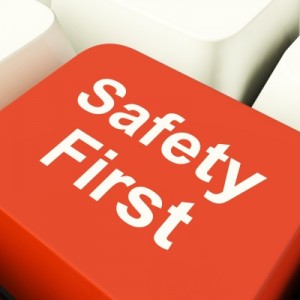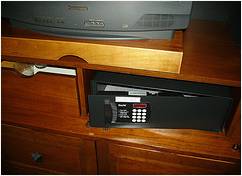Electronic identity theft has become a big problem. According to a report commissioned by the US Secret Service and Verizon, 81% of all data breaches in 2012 involved some form of hacking. In addition, 96% of the data breaches stemmed from external sources. Figures from a report published by LexisNexis show that stolen credit card details account for up to 50% of all fraudulent transactions reported by online retailers. Read on to learn more about tips that you can use to keep your personal and credit card information safe.
Secure Your Home Network

Many people run wireless Internet networks at home. The bad news is most of these networks are not secure, and this makes it easier for hackers to infiltrate such networks and steal personal finance information. Fortunately, most wireless routers include a firewall to block any unauthorized attempts to access your home network. Unfortunately, most are not configured properly.
1) Routers include two different sets of usernames and passwords. To secure your home network, start by changing the default Router Name and wireless password. This is what a wireless user will need to access your network. To be on the safe side, create a password using a mix of symbols, letters, and numbers to make it harder for hackers to crack. Of course, long passwords are typically harder to crack, thereby more secure.
2) The other username and password is strictly for you as the network administrator and this is the one most users fail to secure. Be sure and change the administrator username and password so it will be only accessible to you and make it different than the wireless username and password.
3) Unless you know exactly what you are doing, your router should have “remote management” disabled. This means that you have to be physically connected to the router (and know the administrator password) in order to make changes to your network settings.
Do Not Post Personal Information on Social Networks
Social networks such as Facebook, Twitter, Pinterest, LinkedIn, YouTube, and Google+ have become an integral part of modern lifestyles. While staying connected with other people is not a bad idea, posting personal information on social networks is not a good idea. In fact, two researchers at Carnegie Mellon University correctly guessed the social security numbers of random people using information posted on social networking sites. Astonishingly, the researchers identified all nine digits using less than 1,000 attempts for every study subject. This shows that a determined hacker with a powerful computer can do real damage. The researchers recommend never using your social security number as ID on any site. Also never use your birthday or anniversary as a password.
One of the easiest ways for hackers to access your information is for them to simply con you into letting them in. A friend of mine recently got a call from someone claiming to work for Microsoft. The caller asked if he had recently clicked the button “Send information to Microsoft” since he had he replied yes. (most people do send this information from time to time) Then the caller asked my friend to grant him the ability to diagnose his computer remotely which my friend did. At this point, the caller had full access to my friend’s computer and he began installing some “diagnostic software” which locked up his computer and the caller then said he would have to charge $175 to unlock the computer. My friend quickly unplugged his network cable and said he’d rather throw the computer away than pay extortion and hung up. This caller could have just as easily installed some keystroke logging software that would report account numbers, bank balances, and passwords to the hacker. Microsoft won’t call you don’t give callers access to your computer for any reason. If you call tech support that is a different story.
Do Not Open Unsolicited Email Attachments
Another popular technique used by cyber-criminals is called “phishing”. The hackers send emails that look like they have come from authentic government agencies, financial institutions, or even businesses. The messages ask you to verify your credit card information. Never open any attachments or click any suspicious email links especially attachments with a “.zip” extension. The moment you respond to email solicitations for personal information, the hackers will empty your bank account immediately. If you have doubts, search for the company website online and get in touch with the customer care department. Recently I have received phishing emails from people claiming to be eBay, PayPal, several Banks I don’t even have accounts with, bank officials who need my help to get millions out of the country, etc. A good way to check is to put your mouse over the link and see what it says. For instance, the one supposedly from PayPal had an address that was a mile long and started with paypal.zuroixvshdjdy.something.com. Note that although it started with PayPal it didn’t end with PayPal.com. If you know how a domain name is supposed to look you will know that the PayPal in that address is simply a folder on the something.com domain and has absolutely nothing to do with PayPal. So the first step if in doubt is to look at where the click will actually go. Some legitimate emails will go through 3rd party servers for click-tracking purposes or may look like gibberish because they are encrypted so this is not foolproof but it will still help you spot a good portion of the bad guys.
Online Shopping
According to the National Cyber Security Alliance, cyber criminals can easily grab credit card details from unsuspecting online shoppers. If you plan to shop online, make sure you have the latest anti-virus version, operating system, and web browser. Make sure the e-commerce site you are using is legitimate before entering any personal information. A secure and legitimate site will have a closed padlock sign on your web browser’s URL address bar. In addition, the URL address should begin with https:// or shttp://. The additional “s” in http indicates the site encrypts information that consumers provide when making purchases. Using an encrypted connection is like creating a “tunnel” directly from your computer to the server on the other end. This prevents someone from intercepting the signal and copying your information en route. Be very careful about shopping from a public computer if you absolutely have to use a public machine, reboot before you start and close your browser connection when you finish (and preferably reboot again. Leaving the connection on gives cybercriminals the opportunity to install malware, key loggers, and viruses. And even rebooting doesn’t guarantee that one isn’t already installed on the computer but it does prevent someone after you from simply logging back into your open account.
If you know you are going to have to use public computers some credit card companies like Bank of America have programs that will issue temporary credit card numbers. These are sometimes called “disposable,” “temporary” or “one-time use” numbers. They are attached to your regular credit card but do not expose your real credit card number. You can choose a lower limit for the temporary number and you can set the expiration anywhere from a day to a full year. So if you are going to be traveling and using public computers for the next month, you can set the expiration for a month from now. Then simply use that number like your regular card number but with a much lower risk level.
Or perhaps you are dealing with a merchant that you don’t fully trust, you could create a temporary card number good for 1 day and the exact amount of your purchase. That way he can only charge the one charge and nothing else.
The Internet makes it extremely easy for people to share information, socialize, and even conduct business. However, cybercriminals have found ways of exploiting inherent Internet weaknesses to fraudulently access personal consumer information. To stay a step ahead of hackers, secure your wireless home network, avoid opening unsolicited email attachments, and do not post personal information on social networks.
See Also:
- 6 things to know about virtual credit card numbers
- College Savings Accounts
- High Performance Savings Accounts
- How to Up Your Credit Score
- 6 wedding expenses you should always charge on credit
Recommended by Amazon:
- Cybersecurity: What Everyone Needs to Know
- America the Vulnerable: Inside the New Threat Matrix of Digital Espionage, Crime, and Warfare
- Norton 360- Comprehensive protection – detects and eliminates viruses, stops online threats, defends against online identity theft and safeguards your important stuff from loss.
- The Net – Classic hacker movie starring Sandra Bullock.
- Hackers
Image courtesy of Stuart Miles / FreeDigitalPhotos.net



